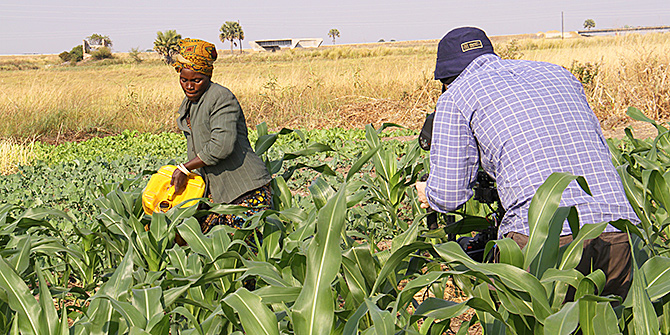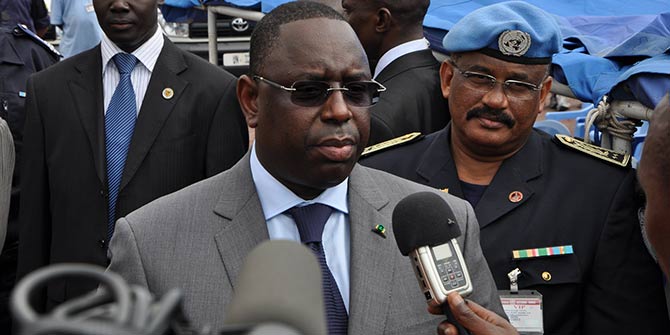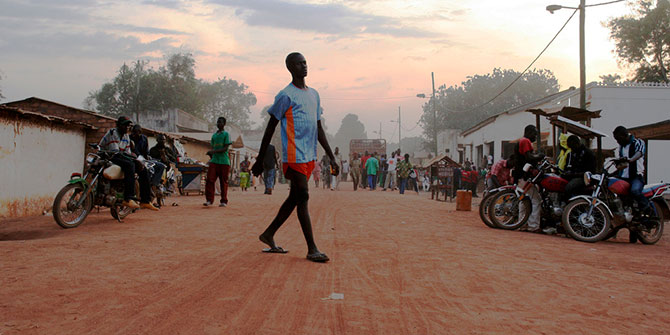While rehabilitating and reintegrating former LRA fighters, the international NGO World Vision emphasises Christian values of forgiveness. Despite this, few returnees remain ‘saved’ once they return to their communities. Dr Grace Akello investigates why this is the case, and what this means for reintegration programmes in the future.
This article is part of the #PublicAuthority blog series, part of the ESRC-funded Centre for Public Authority and International Development.
For international NGO World Vision, instilling Christian values in returnees is key to the rehabilitation and reintegration of former Lord’s Resistance Army (LRA) fighters in northern Uganda. After being rescued at the warfront, former fighters are taken to the World Vision Centre for Formerly Abducted Children (WVCFAC), where the Ten Commandments and numerous biblical scripts about God’s love are engraved on counselling room walls.
After returnees are interviewed and their biodata and wartime history documented, a Christian pastor frequently discusses faith matters. Counsellors preached the love of Jesus Christ and God’s forgiveness for returnees’ sins. In particular, counsellors emphasise the importance of forgiving captors, for they did not know what they were doing, including conscripting children into a senseless war.
As I have described in an article previously, a successfully rehabilitated returnee deemed ready for reintegration at WVCFAC was one who had listened to the gospel of Jesus Christ, repented their sins and accepted Jesus Christ as their saviour. The returnee was registered by the centre as ‘saved’. In fact, by my observation, all returnees accepted Jesus Christ as their saviour prior to reintegration, creating a sense of moral populism, which is defined here as “social and political power produced by exclusivist and morally-imbued identities and values”.
I observed over 200 LRA returnee adults and children who became born-again Christians during my 12-month-long ethnographic study in 2004-2005. Many ‘saved’ returnees were reintegrated in the displaced persons camps with people whom they had previously exposed to mass violence. At reintegration, counsellors made speeches concerning the changed status of returnees because they had accepted Jesus Christ and were ‘saved’. Communities were then advised to help the returnee live a normal civilian life. If there was a pastor of a born-again church in that community, s/he was asked to mentor a newly- ‘saved’ member and -advised to shepherd him or her and ensure their Christian growth.
But what happens to these Christian identities after re-integration? In 2018, I conducted a three month ethnographic study with returnees where I specifically enquired about their morally-imbued identity, saved status and whether their morality, behaviour and values had changed after rehabilitation and reintegration facilitated by WVCFAC. And if they were still ‘saved’, how did their violent past influence their new moral identity and social values?

The key finding was that, of the eight female and 28 male returnees who were ‘saved’ adults at reintegration, only one person was still born again. The other 35 returnees had instead embraced new moral identities which contradicted their ‘saved’ status. They mentioned that the very dynamics in the community prevented them from maintaining their newly-accepted faith. For example, soon after their reintegration, predominantly Catholic families organised a mass to celebrate their return, at which the Reverend Father was invited to officiate. Typically, he reinforced Catholicism through reminding the returnees that they were Catholics, and Catholicism was the only true religion – and what is more, they worshipped the same God as the born-again Christians.
Further, five returnees mentioned that because of the indigenous ceremonies to cleanse them from the cen (evil spirits) at reintegration, they stopped being ‘saved’; in worshipping other gods during the cleansing ceremony, the Ten Commandments were violated.
Fourteen returnees mentioned that “unlike the World Vision counsellors and pastors who preached love, the village pastors emphasised repentance of sins they had committed as fighters on Acholi people, reminding them about everything they did in the bush and reminding them about enormous suffering in camps caused by the LRA. After many Sunday services with the same message, they left the church”. Five returnees had resorted to being agnostic and not attending any religious meeting due to this. In eight conversations, returnees grappled with the idea that at WVCFAC they were told that they were only forced to commit war violence and that they were not responsible for those acts: but the village reverends, pastors and fathers always mentioned that everyone had sinned, and that they needed to repent.
Detachment from Christian values, also called secularisation, I suggest is a new form of moral populism. It is a new moral identity because many former fighters embraced the idea, found it more palatable not to adhere with Christian moral principles. Doing so enabled them to avoid dwelling on their violent past, feel exonerated, and not accountable for the atrocities they committed. Secularisation, and externalising their past ultimately removed obligations to repent, obligations to approach the violated in reconciliation, and ultimately secularisation enabled former fighters to attribute responsibility of their violent past to their LRA leaders and not themselves. On the contrary, village clergy preferred returnees to internalise, reflect on their past and repercussions on the community in which they lived.
The returnees needed to distance themselves from such teachings and only preferred the WVCFAC’s way of preaching and counselling in order to become saved. The only returnee who was still saved had become a pastor himself, selecting what to preach. He continued to struggle with his past which, though he believed was forgiven by God, had not been forgiven by the Acholi people. Each time he remembered this, he “prayed a lot for forgiveness”.
Generally, I observed changing patterns of moral populism while examining the efficacy of the Christian approach of reintegrating returnees among people who were exposed to war violence. The lack of consistency in Christian approach, the pressures in the community to adhere with other religions and the bluntness of village clergy made returnees reject the very faith they readily accepted when they lived at the WVCFAC.
This demonstrates the importance of community engagement and involving all stakeholders in designing DDR programmes. Doing so will mitigate against the unintended consequences of stigmatisation and disregarding the power of morally-imbued identities and values by the community. Community engagement and support will facilitate returnees’ adherence with their new-found faith.
Read more about #PublicAuthority and visit our website.
Dr Grace Akello is a Visiting Professor at the Firoz Lalji Centre for Africa and a Ruth Glass Memorial Fellow in LSE’s Department of International Development. Dr Akello is also an Associate Professor in the Faculty of Medicine at Gulu University in Uganda.
The views expressed in this post are those of the author and in no way reflect those of the Africa at LSE blog, the Firoz Lalji Centre for Africa or the London School of Economics and Political Science.






Interesting research, however the tendency of what you referred to “secularisation” is not particularly common only with former combatants. It also happens with people in extreme poverty and civilians affected by conflicts trying to find comfort and and solutions. I observed similar trends while I was working in Sierra Leone.
However, there are other reasons in my view that I think may be an addition to reasons observed in your research. If secularisation is a transformation of a society from close identification with religious values and institutions towards non-religious ones, then I don’t think that many societies in Africa and indeed northern Uganda have ever been been strictly followed Abrahamic religions. Instead, they developed a way of practising christianity alongside traditional beliefs ( which I call religions).
Most people and societies in Africa have not fully taken monolithic religions introduced them by missionaries and Arab traders. Despite many people claiming to be Christians/ Muslims, they still practice traditional religions as well. So such detachment from so-called Christian values can be a result as many African societies were not fully committed to Christian values in the first place.
Secondly, vulnerable people usually turn to some kind of higher authority (such as governments) for assistance. In many cases, especially in SSA, states have not provided help, so religious institutions and NGOs take on these roles. NGOs such as World Vision have been in Africa since the 60s and people are now starting to realise that they don’t offer solutions and are now turning away or flip flopping to similar organisations recycling same message. It’s not secularism in my view. I would not describe the trend of people seeking comfort in their own traditional beliefs to moral populism, simply because, similar trends happen in societies that have not experienced societal breakdown or violent conflict but other situations such as extreme inequality.
I think that it would be interesting to know how those children lived spiritually in bush? It may shed more light on why WV failed in their approach. But I think that DDR cannot be done by an NGO, even non-combatant personnel leaving the army need specially trained psychologists to prepare them for civilian life. In the case of children, some different approaches that have been used. Say for example one used by NRM child soldiers. They stayed in the army in “kadogo” schools until they were adults. As one of your case studies showed, a former combatant was not prepared to be integrated into civilian life but instead returned to rebel activity. This explains why it is important to understand how the military works before one thinks of rehabilitation.